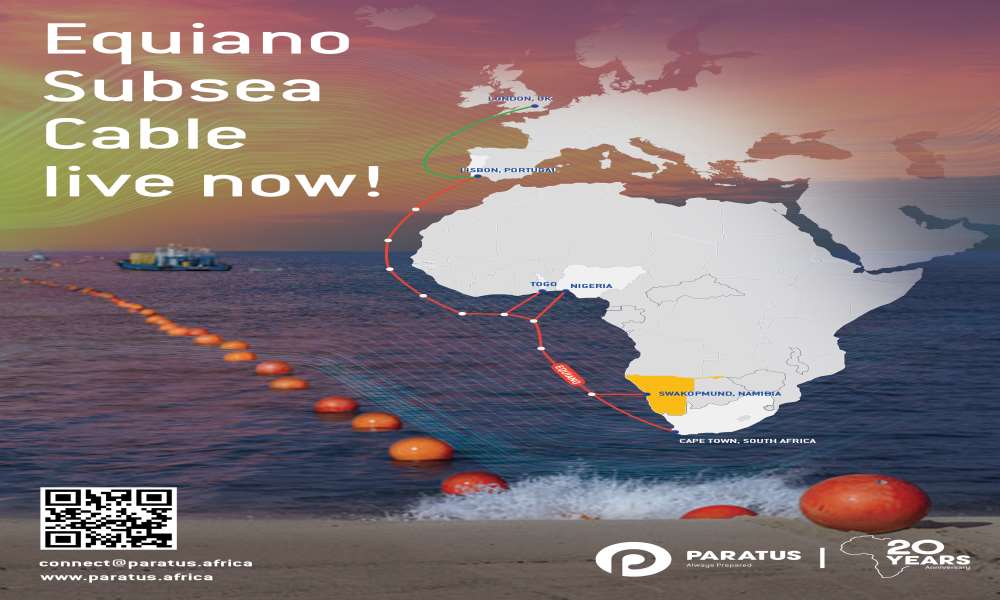Equiano Cable activated in Namibia
Paratus, the landing partner for the Equiano subsea cable in Namibia, announced the activation of the cable. This momentous occasion marks a significant milestone in the delivery of enhanced connectivity to Namibia and the broader SADC region. Equiano, with its landing points in Lisbon, Benin, Nigeria, St Helena, Namibia, and South Africa, is poised to revolutionize cable diversity and create new economic opportunities throughout the region. With its impressive 12 fiber pairs and design capacity of 144 Tbps, the Equiano subsea cable provides approximately 20 times more capacity than existing cables connecting Europe to South Africa. This unparalleled capacity, which is enabled by open access via the landing station in Swakopmund, unlocks unprecedented potential for all operators.
According to an economic impact assessment conducted by Africa Practice and Genesis Analytics, the Equiano subsea cable is projected to increase internet penetration in Namibia by 7.5% by 2025. This development is expected to stimulate substantial economic growth, job creation, and sustainability, positively impacting the lives of the population in the western African countries where Equiano has a landing station, which represents approximately 31% of Africa's total population. Furthermore, neighbouring countries, including landlocked nations, will also benefit from Equiano's presence through various cross-border terrestrial fiber networks, amplifying the transformative power of the cable across the entire region.
CEO of the Paratus Group, Schalk Erasmus expressed his excitement: "Today marks a major milestone in the development of the Equiano story, bringing significant opportunities to the region. The sizeable jump in available capacity allows us to export this capacity to the rest of the region, benefiting not only Namibia but also fostering connectivity and progress across the SADC region. Equiano opens up new opportunities for competition, fair pricing, and expanded choices, unlocking the potential for economic growth and digital transformation. It strengthens Namibia's international connectivity demands and, importantly, integrates seamlessly with the extensive terrestrial fiber network owned and operated by Paratus. We've invested over $-40 million over the last five years to build robust infrastructure that can ensure the lowest latency from Johannesburg to Lisbon and London, thanks to the combined power of our network and the Equiano cable.”
Paratus has strategically built an expansive terrestrial fiber network across southern Africa, including essential cross-border links from its Equiano landing station in Namibia to Zambia and Botswana, and from Botswana to Johannesburg. This unique network configuration bypasses central and western South Africa, traversing Windhoek and Gaborone, and offers true resilience and redundancy, ensuring exceptional connectivity and uninterrupted services. The result is improved latency, reduced to sub 135ms, with future improvements expected to bring the latency down even further to sub 125ms from JHB to Lisbon and approximately 150ms from JHB to London. These significant advancements provide not only improved latency but also offer true resilience and redundancy.
Erasmus concluded: "We take immense pride in being the landing partner for Equiano in Namibia. This milestone will deliver improved connectivity to all Africans, aligning with our mission to transform Africa through exceptional digital infrastructure and customer service."
With the activation of the Equiano cable in Namibia, the country and the entire African region are poised for remarkable progress, benefiting from increased capacity, enhanced reliability, and reduced latency. This ground-breaking project sets a new standard for digital infrastructure, driving economic growth, job creation, and sustainable development throughout Africa.
According to an economic impact assessment conducted by Africa Practice and Genesis Analytics, the Equiano subsea cable is projected to increase internet penetration in Namibia by 7.5% by 2025. This development is expected to stimulate substantial economic growth, job creation, and sustainability, positively impacting the lives of the population in the western African countries where Equiano has a landing station, which represents approximately 31% of Africa's total population. Furthermore, neighbouring countries, including landlocked nations, will also benefit from Equiano's presence through various cross-border terrestrial fiber networks, amplifying the transformative power of the cable across the entire region.
CEO of the Paratus Group, Schalk Erasmus expressed his excitement: "Today marks a major milestone in the development of the Equiano story, bringing significant opportunities to the region. The sizeable jump in available capacity allows us to export this capacity to the rest of the region, benefiting not only Namibia but also fostering connectivity and progress across the SADC region. Equiano opens up new opportunities for competition, fair pricing, and expanded choices, unlocking the potential for economic growth and digital transformation. It strengthens Namibia's international connectivity demands and, importantly, integrates seamlessly with the extensive terrestrial fiber network owned and operated by Paratus. We've invested over $-40 million over the last five years to build robust infrastructure that can ensure the lowest latency from Johannesburg to Lisbon and London, thanks to the combined power of our network and the Equiano cable.”
Paratus has strategically built an expansive terrestrial fiber network across southern Africa, including essential cross-border links from its Equiano landing station in Namibia to Zambia and Botswana, and from Botswana to Johannesburg. This unique network configuration bypasses central and western South Africa, traversing Windhoek and Gaborone, and offers true resilience and redundancy, ensuring exceptional connectivity and uninterrupted services. The result is improved latency, reduced to sub 135ms, with future improvements expected to bring the latency down even further to sub 125ms from JHB to Lisbon and approximately 150ms from JHB to London. These significant advancements provide not only improved latency but also offer true resilience and redundancy.
Erasmus concluded: "We take immense pride in being the landing partner for Equiano in Namibia. This milestone will deliver improved connectivity to all Africans, aligning with our mission to transform Africa through exceptional digital infrastructure and customer service."
With the activation of the Equiano cable in Namibia, the country and the entire African region are poised for remarkable progress, benefiting from increased capacity, enhanced reliability, and reduced latency. This ground-breaking project sets a new standard for digital infrastructure, driving economic growth, job creation, and sustainable development throughout Africa.





Comments
Namibian Sun
No comments have been left on this article